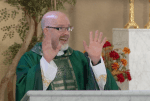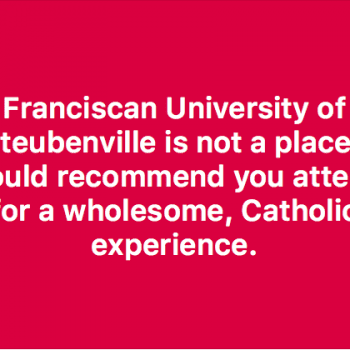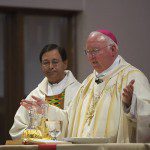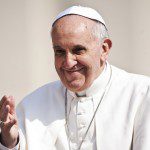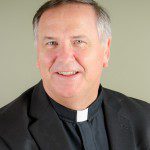“It is no robbery if princes exact from their subjects that which is due to them for the safe-guarding of the common good, even if they use violence in so doing”
– St. Thomas Aquinas“It is not theft, properly speaking, to take secretly and use another’s property in a case of extreme need: because that which he takes for the support of his life becomes his own property by reason of that need. In a case of a like need a man may also take secretly another’s property in order to succor his neighbor in need.”
– St. Thomas Aquinas“…[T]he right of having a share of earthly goods sufficient for oneself and one’s family belongs to everyone. The Fathers and Doctors of the Church held this opinion, teaching that men are obliged to come to the relief of the poor and to do so not merely out of their superfluous goods. If one is in extreme necessity, he has the right to procure for himself what he needs out of the riches of others.”
– Pastoral Constitution on the Church in the Modern World, #69.The “theology of liberation” is often connected (sometimes too exclusively) with Latin America; but it must be admitted that one of the great contemporary theologians, Hans Urs von Balthassar, is right when he demands a theology of liberation on a universal scale.
– Saint Pope John Paul II

Last week, Breitbart did us the favor of reporting and publishing a memo produced by ‘CatholicVote’ warning of Tim Kaine’s embrace of liberation theology.
‘CatholicVote’ seems to think we should be afraid of liberation theology and anyone who is a fan of it.
The letter begins:
In media appearances since he was named the Vice Presidential running mate of Secretary Clinton, Tim Kaine has continuously referenced his time in Honduras as the decisive period that helped shape both his political and religious views. The facts surrounding this “mission trip,” however, raise grave and serious concerns, particularly given his continued relationships with the successors of a number of political and religious extremists.
Catholic voters and leaders are entitled to the truth about this decisive period in Kaine’s life. This memo has been published based on extensive research and reporting in an effort to help all people of good will better understand the background, people, places, and ideology that Tim Kaine has personally cited as integral to his public life.
It continues:
Kaine’s trip is touted in news reports, on stage, and on his social media channels, yet a deeper dive on what transpired there raises significant questions and concerns. During his stay in Honduras, Kaine openly embraced liberation theology, a controversial political ideology cloaked in Catholic teaching, but radically at odds with the Catholic Church and with the United States. At the time, this extremist ideology was adopted by activists and even some clergy who were openly hostile to the Church, the Pope, and the United States. The Marxist elements of this ideology were condemned by the Vatican in the 1980’s and 1990’s. During his time in Latin America, Kaine was surrounded by radicals and their influences took root in the version of Christianity he adopted. According to the New York Times, it was this theology that set him on a “left- veering career path” influencing his politics to the present day.
Although the Marxist roots of liberation theology were condemned by the Church, the new theology did have the support of another superpower – the Soviet Union. Scholars of the period, and the top Cold War defector to the West, have shown the Soviets created liberation theology to undermine the Church and advance the Soviet cause against the United States. In Honduras, the phony Marxist-tinged theology was planted to manipulate poor Catholics, instigate terrorism, and stir up a violent revolution in Honduras — then the key ally of the United States opposing Communism in the region.
The New York Times reports that while in Honduras, Kaine took a bus trip into northern Nicaragua before walking several miles on foot to meet with Fr. James Carney, one of liberation theology’s most radical proponents. Carney believed that violence was part of God’s plan for social and political change. In his book, Carney wrote: “I invite all Christians who read this to get rid of any unfair and un-Christian prejudices you have against armed rebellion, socialism, Marxism and communism.” (440) Carney’s dedication was so complete that he renounced his American citizenship and eventually left the priesthood because they “did not permit a Jesuit to be a guerrilla fighter.” (440) Fr. Carney later joined the Sandinista rebel army and supported action as a “chaplain” against the United States’ efforts to oppose Communism in Latin America. Three years after meeting Kaine, Carney died during an invasion of Honduras with a group of approximately 100 fellow communist insurgents, trained by communists in Nicaragua and Cuba.
Before his death, Carney helped found Radio Progresso, a socialist-inspired radio outlet that continues to broadcast today. Kaine remains in touch with Father Carney’s successor, Jesuit Father Ismael Moreno Coto (known as ‘Father Melo’). Father Melo, who has called for the redistribution of land in Latin America by 2021, told listeners in 2015 “to follow [Father Carney’s] footsteps and memory of struggling to continue to build a more just and equitable society.”
Given Father Carney’s identification with terrorists and his participation in an armed invasion of Honduras, Father Melo’s call to action begs an important question: has Father Melo disavowed the radical agenda of his predecessor? And what is Tim Kaine’s relationship today to the Melo/Carney ideology? [Emphasis my own; superscript removed.]
Pardon the long excerpt. Feel free to read the whole memo.
It’s interesting to read that liberation theology is/was “radically at odds with the Catholic Church and with the United States.” That it is/was at odds with the Catholic Church is not the case – only certain aspects of particular strands were. As usual, ‘CatholicVote’ doesn’t have to know what its talking about to talk about it. It is correct in noting that the theology of liberation doesn’t support the U.S. empire, however – nothing Catholic does.
Clarifying its position in the same paragraph, ‘CatholicVote’ says “The Marxist elements of this ideology [not Liberation Theology itself] were condemned by the Vatican in the 1980’s and 1990’s.” Which Marxist elements? The memo points to one of two documents by the Congregation for the Doctrine of the Faith (CDF) headed by Joseph Cardinal Ratzinger (later Pope Benedict XVI): Instruction on Certain Aspects of the “Theology of Liberation” (1984).
Certain groups associated with liberation theology held atheistic views, or believed in the necessity (read: unavoidable resort to) of armed violence – this is unacceptable for Catholics, obviously, but this wasn’t Catholic liberation theology, as such.
Moreover, not all things Marx(ist) are condemned. Let’s consider one of the first paragraphs of the ‘instruction‘:
The present Instruction has a much more limited and precise purpose: to draw the attention of pastors, theologians, and all the faithful to the deviations, and risks of deviation, damaging to the faith and to Christian living, that are brought about by certain forms of liberation theology which use, in an insufficiently critical manner, concepts borrowed from various currents of Marxist thought. (Emphasis mine.)
Unfortunately, the “Instruction” didn’t do much to halt the efforts of most Catholic liberation theologians (see E. Dussel), as it didn’t apply to the work they were doing.
A useful piece of text found in the letter/memo put out by ‘CatholicVote’ is their disclaimer: “we do not claim to speak for the United States Conference of Catholic Bishops….” Why is this useful? Because it reminds us of when – against the dull approach of ‘CatholicVote’ – the Bishops of the United States noted the positive role Karl Marx and Marxists have played in challenging Christians towards a fuller commitment to liberation – etc. -, but also the use of Marxist criticism in Catholic thought (consider Pope Saint John Paul II and alienation; see the National Conference of Catholic Bishops’ Pastoral Letter on Marxist Communism, 12 Nov. 1980).
A second document was released by the CDF on liberation theology that was not mentioned by ‘CatholicVote’: Instruction on Christian Freedom and Liberation (1986).
What’s significant here is that one focus in ‘CatholicVote”s memo is on armed violence. Now, the liberation theology I am closest to rejects armed violence (again, see E. Dussel). However, even where some liberation theologies embrace it as an option of last resort, it cannot be seen as making the theology of liberation condemnable, whether the influence or similarity on this point to “Marxism” is there.
Armed violence? Is ‘CatholicVote’ actually suggesting that armed violence is absolutely forbidden to protect the dignity of persons? Or, are they simply rejecting liberation theology – and some socialism – that would allow for it under certain conditions, but not rejecting other ideologies that live off of (armed) violence – such as capitalism?
Violence – armed violence – would seem to be an acceptable, though undesirable, way of promoting and defending the common good against tyrannies – such as the US and US backed dictatorships. It is hard to justify, but not necessarily unjustifiable. Non-armed violence should be implemented where possible. Of course, plenty is involved in this analysis, but consider what Ratzinger’s CDF said:
These principles must be especially applied in the extreme case where there is recourse to armed struggle, which the Church’s Magisterium admits as a last resort to put an end to an obvious and prolonged tyranny which is gravely damaging the fundamental rights of individuals and the common good. Nevertheless, the concrete application of this means can not be contemplated until there has been a very rigorous analysis of the situation. Indeed, because of the continual development of the technology of violence and the increasingly serious dangers implied in its recourse, that which today is termed “passive resistance” shows a way more conformable to moral principles and having no less prospects for success.
Pius XI said something similar as it applied to the Cristero War (in a document cited by the CDF):
You have more than once recalled to your Faithful that the Church protects peace and order, even at the cost of grave sacrifices, and that it condemns every unjust insurrection or violence against constituted powers. On the other hand, among you it has also been said that, whenever these powers arise against justice and truth even to destroying the very foundations of authority, it is not to be seen how those citizens are to be condemned who united to defend themselves and the nation, by licit and appropriate means, against those who make use of public power to bring it to ruin.
One cannot disregard the great contributions liberation theology and liberation philosophy have made to Catholic thought and action – liberation theology has a place on the USCCB’s website and is smiled upon in numerous Papal works: consider the preferential option – or love – for the poor, the criticism of structural sin, base ecclesial communities, talk of the periphery and center, Jesus Christ as Liberator, the Face of the poor, the option for the poor in caring for creation, the CDF’s Prefect co-authoring a text with Gustavo Gutierrez, the Pope’s teacher – Juan-Carlos Scannone – being a co-founder of Liberation Philosophy and acknowledging the use of Marxist analysis, and Pope Francis’s shout-out to liberation theologian Leonardo Boff in Laudato si’ where we hear of a “cry of the earth, cry of the poor,” etc., etc.
Oh – I almost forgot: ‘CatholicVote’ wants us to believe that Liberation Theology was a Soviet creation. I’m not sure how much liberation theology or liberation philosophy has been read by the folks at ‘CatholicVote’, or their history, but John Allen does a nice job at considering the conspiracy here.
‘CatholicVote’ is wrong to lack precision in its brief treatment of liberation theology and in considering the goals of the Catholic Church as compatible or comparable with the socio-economic goals of the United States of America – especially its neoliberal, that is, capitalist domination and neocolonialism.
That said, whether it is liberation theology or its opposition to ‘the American way’, its use of Marxist analysis or, in some cases within some currents, its last resort to armed violence, none of this, if it is truly something Tim Kaine identifies with, automatically makes a useful case against the Dem. VP nominee or Hillary Clinton.
What does make a useful case against a Clinton presidency? It’s easy. The same thing that makes a useful case against a Trump presidency: their bourgeois mentality. Neither option is pro-life, neither is pro-family.
Check out your local library and learn about liberation theology!
Also, forget about ‘CatholicVote’ – there are much better resources and conversations taking place to aid Catholics in living their faith.
Until next time,
Keith Michael Estrada

